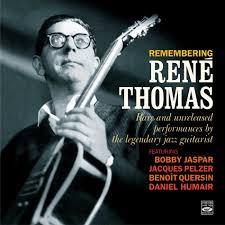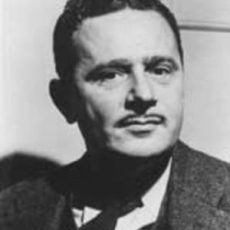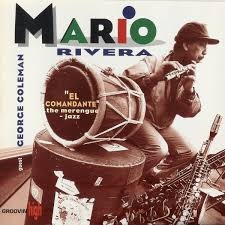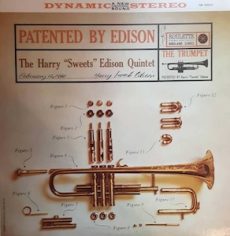
Daily Dose Of Jazz…
Benoît Quersin was born in Brussels, Belgium on July 24, 1927 into a family with a classical tradition. He met personalities like the composer Béla Bartókor and the pianist Stefan Askenaseat at a very young age. Shortly before the war, he discovered jazz secretly in his bedroom while listening to the records of Fats Waller and Louis Armstrong, then Belgian jazz bandleader Fud Candrix.
His beginnings as a musician were with the kids in his Brussels neighborhood. At the Liberation, Quersin set up his first orchestra. In 1947 he hired Jean Thielemans, who later became known as Toots, with whom he played for some time. He abandoned the piano for the double bass and obtained his first engagements. Toots took him to the Paris, France festival at a time when the headliners were Charlie Parker and Miles Davis.
Moving to Paris in 1950 he played and recorded with Sidney Bechet, Lionel Hampton, Sarah Vaughan, Dizzy Gillespie, Chet Baker, Lucky Thompson, Zoot Sims, Lee Konitz, Jimmy Gourley, Blossom Dearie, Mary Lou Williams, Kenny Clarke, and Jonah Jones among others. The French musicians were Stéphane Grappelli, Maurice Vander, Barney Wilen, Henri Renaud, René Urtreger, Sacha Distel, and Martial Solal, the Belgians were René Thomas, Bobby Jaspar, Francy Boland, Leo Mouse, Jacques Pelzer, and Jack Sels.
Returning to Belgium in 1957 he opened a jazz club in Brussels, the Blue Note, where people like Lou Bennett, Jackie McLean, Martial Solalor and Marc Moulin. In 1961, Quersin became host of jazz programs on Belgium radio RTB and interviewed Charles Mingus, Thelonious Monk, Ray Charles, Fats Domino and John Coltrane. Late in life he became an ethno-musicologist, passionate about world civilizations and the music of West and Central Africa, and collected traditional music from the Mbam ethnic group inCameroon. He would go on tomove to Zaire, Democratic Reublic of Congo and release several albums of traditional instruments.
Double bassist Benoît Quersin, who was an important double bassist on the international jazz scene during the 1950s and Sixties, died on May 31, 1992 in Vaison-la-Romaine, France.
More Posts: bass,ethnomusicology,history,instrumental,jazz,music

Jazz Poems
STRANGE FRUIT
Southern trees bear a strange fruitBlood on the leaves and blood at the root
Black body swinging in the Southern breeze
Strange fruit hanging from the poplar trees
Pastoral scene of the gallant South
The bulging eyes and the twisted mouth
Scent of magnolia sweet and fresh
And the sudden smell of burning flesh
Here is a fruit for the crows to pluck,
For the rain to gather, for the wind to suck
For the sun to rot, for a tree to drop,
Here is a strange and bitter crop.
LEWIS ALLANfrom Jazz Poems ~ Selected and Edited by Kevin Young
More Posts: book,classic,collectible,history,jazz,library,poet

Daily Dose Of Jazz…
Emmett Berry was born on July 23, 1915 in Macon, Georgia and began to study classical trumpet, but by 18 had switched to jazz and moved to New York City. Becoming a member of Fletcher Henderson’s band he later replaced Roy Eldridge as soloist.
In the 1940s he worked in Eldridge’s Little Jazz Trumpet Ensemble. He also played in Count Basie’s band. He is known as an accompanist for Billie Holiday, was in the photograph known as A Great Day in Harlem, and the special The Sound of Jazz.
He recorded 39 albums as a sideman with Buck Clayton, Johnny Hodges, Sammy Price, Jimmy Rushing, Cannonball Adderley, Count Basie, Sidney Bechet, Ruby Braff, Bobby Donaldson, Dizzy Gillespie, Edmond Hall, Coleman Hawkins, Fletcher Henderson, Claude Hopkins, Jo Jones, Red Prysock, Buddy Rich, Pee Wee Russell, Maxim Saury, Buddy Tate, Joe Williams, and Jimmy Witherspoon.
Trumpeter Emmett Berry, who also played flute, piano, vibraphone, congas, and drums, died in Cleveland, Ohio on June 22, 1993.
More Posts: history,instrumental,jazz,music,trumpet

Daily Dose Of Jazz…
Mario Rivera was born on July 22, 1939 in Santo Domingo, Dominican Republic and learned to play during his childhood. Moving to New York City in 1961 at 22 he started working with singer Joe Valle as his accompanist. He spent two years with bandleader Tito Rodríguez. During his career he worked with Mongo Santamaria, Eddie Palmieri, and Machito.
From the 1970s to the 1990s he worked with Tito Puente. Both appeared in the films Calle 54 and The Mambo Kings. In 1988 he became a member of the United Nations Orchestra led by Dizzy Gillespie. He was also a member of the Afro-Cuban Jazz Band led by Chico O’Farrill. His only solo album, El Commandante, was released in 1996.
He recorded seventy-six albums as a sideman with Willie Colon, Cheo Feliciano, Dizzy Gillespie, Kip Hanrahan, Conrad Herwig, Giovanni Hidalgo, Chico O’Farrill, Eddie Palmieri, Tito Puente, Tito Rodriguez, Típica 73, Africando, Alfredo “Chocolate” Armenteros, Soledad Bravo, George Coleman, Junior Cook, Rafael Cortijo, Tito Gomez, Jerry Gonzalez, Juan Luis Guerra, La Lupe, Machito, Arturo O’Farrill, Pat Patrick, Bobby Paunetto, Daniel Ponce, Louie Ramirez, Paquito D’Rivera, Alfredo Rodriguez, Mongo Santamaria, Laba Sosseh, Juan Pablo Torres, Stanley Turrentine, Dave Valentin, Fernando Villalona, and Pete Yellin.
Saxophonist Mario Rivera, who also played trumpet, flute, piano, vibraphone, congas, and drums, died from cancer on August 10, 2007 in New York City.
More Posts: bandleader,congas,drums,flute,history,instrumental,jazz,music,piano,saxophone,trumpet,vibraphone

Requisites
Patented By Edison ~ The Harry “Sweets” Edison Quintet | By Eddie Carter
Harry “Sweets” Edison was one of the most sought-after musicians in jazz. This morning’s album from the library is a little-known 1960 release titled Patented By Edison (Roulette R-52041/SR-52041) by The Harry “Sweets” Edison Quintet. He was one of the most talented trumpeters of the Swing and hard bop eras, performing with some of the great jazz orchestras. “Sweets” got his nickname from Lester Young and eventually settled on the West Coast to become a successful arranger, composer and musician. On his eleventh date, he assembled a stellar group: Jimmy Forrest (tracks: A1 to A3, A6, B5, B6) on tenor sax, Tommy Flanagan on piano, Tommy Potter on bass, and Elvin Jones on drums. My copy is the 1967 U.S. Stereo reissue.
The album opens with Witchcraft by Cy Coleman and Carolyn Leigh. The rhythm section introduces the tune before the ensemble starts the easy-flowing melody. “Sweets” is on muted trumpet and glides through the song’s only solo with meticulous execution ahead of the reprise and soft ending. Blues Skies by Irving Berlin begins with Jimmy’s brief introduction, setting the tone for the leader taking charge of the beautifully articulated muted theme and a fine solo spot ahead of the saxophonist leading the ensemble out. Confessin’ That I Love You by Doc Daugherty, Ellis Reynolds and Al Nieburg begins with a pleasant presentation by the quintet. “Sweets” shows off his sentimental side in a performance of innocence and loveliness before the close.
Ain’t Misbehavin’ by Harry Brooks, “Fats” Waller, and Andy Razaf was introduced in the 1929 all-black musical revue Hot Chocolates. It became a huge hit among musicians and vocalists. It is a quartet showcase for “Sweets” doing the honors using the mute for the song’s opening chorus and a delightful solo that concludes softly. The first of three creations from Edison’s pen is up next. Candied Sweets is the album’s second quartet presentation beginning with Flanagan’s introduction. “Sweets” unfolds an attractive muted melody anchored by the trio’s gentle groundwork into his opening statement. The pianist complements the leader in a short, relaxing interpretation, leading to his return for the theme’s restatement and a slow dissolve.
The first side closes with They Can’t Take That Away From Me by George, and Ira Gershwin opens with the mute removed for “Sweets” to lead the quintet through the theme. “Sweets” ignites the first solo with an impeccable display of his playing. Flanagan follows him with a short, sparkling statement leading back to the closing chorus and climax. Side Two starts with the mute back on for the album’s third quartet performance, Tea For Two by Vincent Youmans and Irving Caesar. A catchy tune, with the foursome laying down a gorgeous mid-tempo beat for the theme. “Sweets” blends comfortably with the rhythm section’s accompaniment in the song’s only spotlight displaying a marvelous tone into the theme’s reprise and fadeout.
Up next is There Is No Greater Love by Isham Jones and Marty Symes. This gorgeous standard receives a gorgeous treatment beginning with Flanagan’s introduction to a thoughtfully tender melody by “Sweets.” The leader continues with a soft touch of elegance in the first interpretation. Flanagan also adds a dreamlike softness in a short solo preceding the theme’s restatement and climax. Harry Edison’s Twenty–Forty picks up the pace in a swinging quartet showcase. “Sweets” gets things off to a good start during the muted melody and then makes quick work in the opening statement. Potter gets his first opportunity to solo, and he moves sprightly along off the drive of the rhythm section into the ending theme and close.
It’s Easy To Remember (So Hart To Forget) comes from the pen of Richard Rodgers and Lorenz Hart. The rhythm section’s gentle introduction sets the mood for “Sweets,” who handles the muted melody and song’s only solo with so much emotion and sensitivity that it’ll bring tears to your eyes. We’re invited to join the quintet for some Sweetcakes by Harry Edison next. Jimmy is featured in the opening and closing choruses but does not solo. The melody begins with a bluesy beat that might get some fingers popping and toes tapping along. “Sweets” starts the solos with a delightful interpretation that flows with smooth efficiency. Flanagan comes in next to make a concise comment, which wraps everything up nicely ahead of the reprise of the theme.
The album’s final track is Angel Eyes by Matt Dennis and Earl K. Brent. Jimmy introduces the standard alongside the rhythm section before “Sweets” removes the mute to deliver the intimately personal melody. He has the showcase to himself in a beautiful and deeply moving statement that’s romantic and touching into a gorgeous ending. Teddy Reig produced Patented By Edison, and the recording engineer is unknown. However, the album’s sound quality is very good, possessing an excellent soundstage that brings the musicians to the sweet spot in your listening room with stunning fidelity. If you’re a fan of the trumpet, Harry “Sweets” Edison, or enjoy the sound of swing, I offer for your consideration and highly recommend Patented By Edison by The Harry “Sweets” Edison Quintet. It’s an underrated, excellent album by one of jazz’s best trumpet players and shouldn’t be missed on your next record hunt!
~ Ain’t Misbehavin’, Angel Eyes, Blue Skies, Confessin’ That I Love You, It’s Easy To Remember (So Hard To Forget), Tea For Two, There Is No Greater Love, They Can’t Take That Away From Me – Source: JazzStandards.com ~ Witchcraft – Source: Wikipedia.org © 2024 by Edward Thomas CarterMore Posts: choice,classic,collectible,collector,history,instrumental,jazz,music,trumpet




